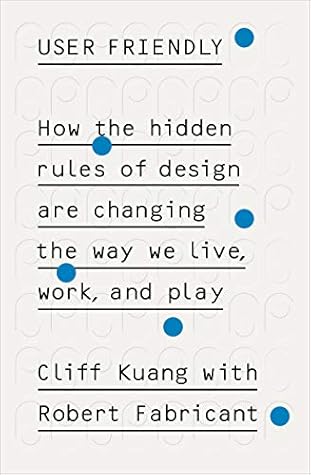More on this book
Community
Kindle Notes & Highlights
by
Cliff Kuang
If you’re a designer, I hope you’ll better understand the origin of the ideas you swim among, so that you might better examine—and even challenge—the values you put into the things you make. At the very least, I hope you’ll be able to offer this book to the people you know and say, “This is why user experience matters.”
no matter how complex the technology, or how familiar, our expectations for it remain the same.
We live in a sandbox of someone else’s design, made more clever because the information on offer on our phones, on our computers, in our cars confines us within a simplified version of the world.
Dreyfuss’s elegant facade hid a smoldering competitiveness and a quiet fury. (A partner in the firm asked him where he got his seemingly impregnable self-confidence in front of clients, which enabled him to stride into a room convinced his ideas should win the day. Dreyfuss, with an uncharacteristic candor, said, “I just walk in saying, to myself, you bastards, you bastards, you bastards.”)
When something hasn’t existed before, how do you make it easy to use? And even after that new thing makes its way into the world, how do you improve it enough so that it disappears into daily life?
How do you get one thousand people to agree on a single detail in an app, or one tiny piece of the MagicBand system, if they don’t share a vision? The modern corporation wasn’t designed to serve up a coherent experience. It was designed for the division of labor, to expend its energies on the efficiency of the parts rather than the shape of the whole.
As the gadgets around us become more and more capable, they’ll need to become more polite, more socially aware. They’ll need to adopt better etiquette, and to do that, they’ll need to model our mores better. They’ll need to reflect a new way of designing that better models human-to-human relationships, rather than human-to-thing interactions. The next generation of design will become less about screens and things, and more about scripts and cues.
What would it be like when even education was tailor-made? Would it mean that we would all live on islands of our own creation? Would it mean that the world of Facebook tribalism—where people listen only to the people whose views chime with their own—would then become not just the world of Facebook, but … the world? “What would it be like to grow up inside that?” de la Mare mused. “How might that facilitate or hinder things like selfishness, empathy, and our ability to deal with adversity?” How strange it would be if the user-friendly world—brought about by industrialized processes for
...more
One doesn’t have to be either a naïf or a tech apologist to believe that the intentions of just a few people can be decisive.


